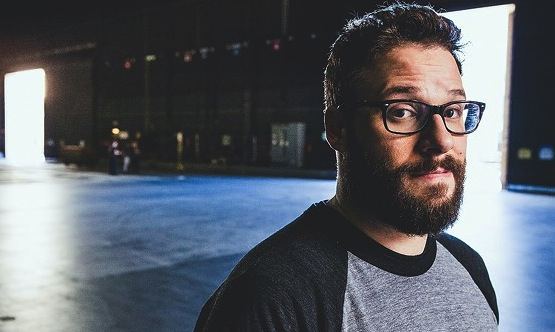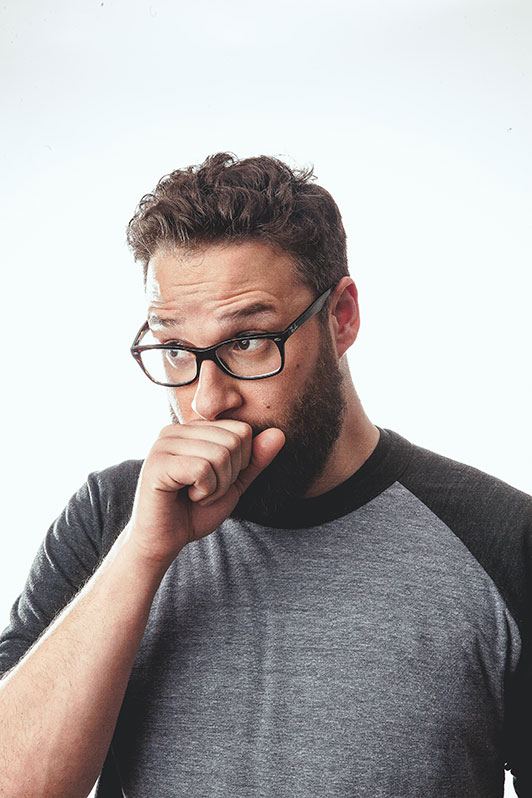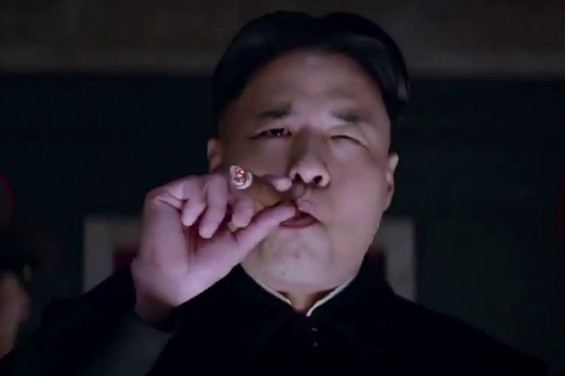jumpincactus
Premium Member
Supporter
- 11,609
- 438

Ryan Orange/LA Weekly.
Seth Rogan.
Sony assumed North Korea would hate the movie. The question was: What would it do? Pyongyang had just tested its atom bomb and threatened "preemptive nuclear attack." And the Supreme Leader with his finger on the trigger was barely over 30, with less than two years of experience.
But Kim Jong-un didn't care about Olympus Has Fallen, even though the violently anti-North Korean 2013 film showed his people strangling women, murdering unarmed men, kidnapping the U.S. president and even executing their fellow citizens. His saber rattlers never mentioned it. That wasn't worth a fight.
A year later, North Korea had a bigger enemy: Seth Rogen.
In the new film The Interview, which Rogen directed with longtime writing partner Evan Goldberg, he plays a trash-TV producer named Aaron who’s become bored with pop culture gossip. Then he and his bimbo host, Dave Skylark (James Franco), score an interview with Kim Jong-un (Randall Park).
There’s a catch and a twist: First, a CIA agent (Lizzy Caplan) commands Aaron and Dave to assassinate Kim Jong-un for the good of the world. Second, Skylark and Kim Jong-un instantly hit it off and spend the trip cruising in tanks listening to Katy Perry, banging chicks at orgies and bonding over the pressures of media scrutiny and disapproving parents. Sighs Kim Jong-un, “You know what’s more destructive than a nuclear bomb? Words.”
In June, two weeks after Sony released The Interview’s first trailer, the Korean Central News Agency slammed Rogen as a “gangster filmmaker” who had made a “blatant act of terrorism and war.” The country promised stern and merciless retaliation and warned that Kim Jong-un himself would see The Interview.
“We were told that they have good hackers in North Korea and that they’ve probably hacked into Sony’s servers and watched the movie already,” Rogen says.
Sony had already been worried about The Interview for months. At its Tokyo headquarters, the company had a front-row seat to Japan’s diplomatic efforts to soothe relations with North Korea. Sony CEO Kazuo Hirai asked studio head Amy Pascal to tone down the film, which she told Rogen was the corporation’s only creative command in her 25-year career.
“You have the power to help me here,” Pascal emailed Rogen. “I haven’t the foggiest notion how to deal with Japanese politics as it relates to Korea, so all I can do is make sure that Sony won’t be put in a bad situation, and even that is subjective.”
“I think if you look, it does not say Sony on the movie,” Rogen claims. “That might have been how that was resolved. This is a Columbia picture,” referring to Sony’s subsidiary.
One month before The Interview’s December 25 opening date, computer hackers imploded Sony’s online network, vaporizing its communications, pirating five new films, publicizing employee Social Security numbers and spilling embarrassing inside information about how the studio makes money. Even the physical security guards at the studio’s Culver City gates were helpless, begging visitors to call in their own credential check and scribbling passes in pen. By the time pseudonymous emails threatened Sony employees’ families, some workers were so exhausted that they stood in the hallways and wept.
Then things really got bad.
Nine days before Christmas, an anonymous group calling itself the Guardians of Peace vowed to launch a 9-11–style attack on any theater showing The Interview. By the next morning, the five largest theater chains in America had dropped the film. Hours later, Sony folded: The Interview was canceled. Said the studio, “Sony Pictures has no further release plans for the film.” Kim Jong Un may have already seen the movie — but, for now, Americans won’t.
Was North Korea behind the attack — and the subsequent threats? A government spokesman denied involvement but accused Sony of “abetting a terrorist act” and suggested the studio “reflect on its wrongdoings.” U.S. officials, meanwhile, say they have found “a linkage to the North Korean government.”
What’s most telling about Kim Jong-un’s regime, a mind-controlling, monolithic dictatorship beyond the wildest dreams of Joseph Stalin or Mao, isn’t that it was furious at a Hollywood film. It’s which film.
It wasn’t Olympus Has Fallen, the cruel action flick with three Oscar nominees in its cast. Not even after the film sent audiences scurrying to Twitter to hiss anti-Asian slurs.
It was the comedy written, directed by and starring a man last seen sword-fighting with a dildo.
Here’s why the North Korean government didn’t mind Olympus Has Fallen: It made them look capable of blowing up the White House. By contrast, The Interview dares joke that Kim Jong-un — gasp! — is scared to drink margaritas because his dad, Kim Jong-il, convinced him they were “gay.”
Fear is fine. But humiliation means war.
In response to the Korean Central News Agency threats, Rogen tweeted, “Apparently Kim Jong Un plans on watching The Interview. I hope he likes it!!”

- Photo by Ryan Orange
- Seth Rogen
“I don’t know, he probably will hate it because it literally has a goal to debase him and humiliate him,” Rogen says.
But at least The Interview does so with a smile. As Randall Park plays him, Kim Jong-un is, well, adorable. At least at first.
“It was important for me to bring a vulnerability to him,” Park says. When he meets Franco’s Dave Skylark, Park squeals with excitement. Park based the moment on the Vice documentary where Kim Jong-un meets basketball player Dennis Rodman.
“He’s shaking a bunch of Americans’ hands and maintaining eye contact with each of them,” Park says. “But as soon as Rodman comes out, he looks away because he’s so nervous — it was a really human side of him that you don’t hear about.”
Kim Jong-un’s classmates from his international school in Switzerland remember the future leader forever doodling pictures of Michael Jordan, “something that I probably did when I was younger,” Park says. He empathized, not only because he, too, loves basketball but also because one of the only things as strange as being a young, unprepared, paranoid Supreme Leader is playing that young Supreme Leader in a moment of global unease.
“As an actor, I’d have some reservations about playing a living dictator,” says Rogen, who later admitted to Park that he was the only actor to audition. “I’m impressed that he did it, honestly.”
The reaction Park was most afraid of was that of his parents, both immigrants from South Korea. Luckily, they gave him their blessing. “They just thought it was a really funny concept — and daring,” he says.
“It’s all based on real shit!” Rogen exclaims. Which is crazy for a few reasons. First, because this is the first script Rogen and Goldberg ever bothered to research. (“If North Korea was a Jeopardy! category, I would do well,” Rogen insists.)
Second, because of the “facts” they’ve found, which sound fake but aren’t. The Interview’s Kim Jong-un has convinced his subjects that he talks to dolphins. (The local marine park vows that Dear Leader personally trained the animals.) An even bolder claim: Kim Jong-un doesn’t have an anus. “He has no need for one,” says his fictional press handler, Sook (Diana Bang).
“I’ve heard defectors say that, too,” North Korea expert James Person of the D.C.-based Wilson Center confirms. “The cult of personality is built to such an extreme that it’s something you would never think of: the leader defecating.”
“As idiots, we obviously gravitated to that one,” Rogen says. “We couldn’t even put in a lot of the shit that is real because it almost starts to feel like we’re just making shit up.” Fun “facts” he and Goldberg couldn’t use: that Kim Jong-un designed every building in North Korea, that he was born with a unicorn in a magical cave and that he invented the hamburger. “Like, literally!” Rogen says, laughing.
Third, despite all of that, the closing credits insist that The Interview is a work of fiction, in which any similarities to persons living or dead are coincidental.
“It’s legally the weirdest shit ever,” Rogen says. “That was the biggest battle. Normally in a movie like this, they would make up a guy — it would be Kim Song Bob.”
But he and Goldberg had already fought a similar battle the year before with the rapture comedy This Is the End, in which Rogen, Franco and friends played themselves fighting the demons of hell. Initially, the studio said no. They fretted it would be too confusing. But Rogen kept making the case.
“We kept saying, ‘The fact that you’re afraid of it means it’s good,’ ” Rogen says. They won that debate and This Is the End went on to make quadruple its budget. This time, when the studio resisted, his counter-argument was prepared: “We were, like, ‘It’s literally happening again!’ ”
Still, Sony’s lawyers weren’t satisfied. In Hollywood, speech may be free — but $45 million film production budgets aren’t. Our capitalist democracy allows filmmakers the First Amendment right to crack any joke they want, but someone still has to pay for the megaphone. (Part of the reason Rogen and Goldberg keep their budgets low is to forestall studio interference — a concession for creative independence.)
The legal team fretted over things Rogen and Goldberg weren’t expecting. In the film’s opening scene, a North Korean moppet sings that she wishes Americans would “drown in their own blood and feces.” The lawyers weren’t nervous about the lyrics. They were nervous that she was superimposed in front of an actual North Korean monument. Legally, movies need permission to show most monuments, Rogen says, no matter what country they’re in. They’re works of art. But who would grant it?
“Some things that are not quite legal were done under the assumption that North Korea won’t sue us,” Rogen says. “But then other things, they just for some reason decided we have to operate under the assumption that North Korea might sue us.” In an email to Pascal, he vented, “This is now a story of Americans changing their movie to make North Koreans happy.”
Studio lawyers saidThe Interview could keep the name Kim Jong-un, the flirtation between the dictator and Skylark, the anus joke, the real-life monument and even the line where the Supreme Leader leers, “Guess what I get tons of? Pussy!” Instead, they asked Rogen to digitally erase Kim Jong-il from the buttons on the North Korean military costumes in fear that it would be considered blasphemous.
“That’s what you want to change?” Rogen guffaws. “It’s literally imperceptible to the human eye for 90 percent of it.” But he agreed. Apparently to North Korea, it would be no laughing matter.

- Randall Park plays Kim Jong-un in The Interview
“Comedy is the greatest way to attack anything like a totalitarian regime,” said Ray Bradbury. “Courage doesn’t do it. Laughs do.”
Bradbury was speaking of The Great Dictator, Charlie Chaplin’s bold lampoon of Adolf Hitler. The Little Tramp was furious when the Nazis called him a “disgusting Jewish acrobat.” Chaplin wasn’t Jewish. But that wasn’t the point. He was upset that being Jewish was an insult — and worse, that more people weren’t offended.
“Hitler must be laughed at,” Chaplin insisted. “I was determined to ridicule their mystic bilge about a pure-blooded race.”
He and Hitler were born just one week apart in April 1889. Both were raised in troubled homes and pursued artistic careers — albeit, in Hitler’s case, temporarily. “He’s the madman, I’m the comic,” Chaplin said. “But it could have been the other way around.”
When Chaplin started work on The Great Dictator in 1939, he wasn’t sure his satire would even be seen. Naturally, it was preemptively banned in Franco’s Spain, Mussolini’s Italy and all Nazi-occupied territory — no surprises there. The one time a projectionist snuck it into a military theater, the German soldiers fired pistols at the screen. But thanks to the Hayes Production Code, which frowned upon breaking Hollywood’s neutrality stance, screenings weren’t even guaranteed in America or Chaplin’s native England.
When Franklin D. Roosevelt learned that Hollywood was giving Chaplin a hard time, he urged the filmmaker to press on. Roosevelt even attended The Great Dictator’s premiere in 1940 — by that time, hating Hitler was politically smart.
Full text
1 2 Next »
LA Weekly has the full story and interview with Rogan.
http://www.tokeofthetown.com/2014/12/seth_rogan_how_a_stoner_and_his_movie_started_an_i.php#more




